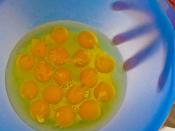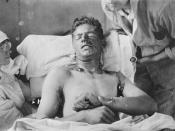Effects of chemical warfare Chemical Warfare is without a doubt the most dangerous and deadly form ofwar possible.. Chemicals, unlike a gunshot wound that would affect only the targetedareas will effect the entire body inside and out. There are differenteffects for different agents or chemicals.
A mans body is armed. He possesses and immune system, a very complex systembroken down to two sections cellular, and chemical. The cellular systemconsists of a plethora of special cells whose job is to kill invadingforeign cells. The body also has cells that act as spy's they detect apathogen. When a chemical gets into the immune system our bodies specialcells some times end up binding together which causes more damage to ourbodies then help. In some cases our body's immune systems do help out butmore often we are seeing the opposite.
To be infected you have to come into direct contact with the pathogen. Thecontact must be specific a cut, puncture wound, inhalation, or ingestion,these are the primary routes of infection.
Many of the chemicals used inpast wars to now day are very short living chemicals, such as chokingagents. This means they can be blown out bye the wind, dissolved by thehumidity, or just simple water. Chemicals in general (when infected) causedisease of the respiratory tract, skin, the central nervous system, theeyes, ears and throat, cardiovascular system, joints, gastrointestinaltract, urogenital system, and liver, and that is only a few. Four majorchemical agents that are explained beyond this point are nerve agents, blood agents, choking agents, and blistering agents. These were and stillare used today.
A never agent is a toxic compound that was designed specifically to kill. It will do exactly that if the amount is intense enough. The toxic effects depend largely on the amount of exposure. The effects range from meiosis,or pinpoint pupils,


